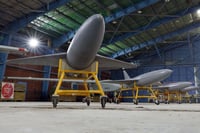
Site of recent Hezbollah drone attack in Hurfeish (Photo by Ayal Margolin/Flash90)
The prospect of war between Israel and Lebanon, particularly involving Hezbollah, is a subject of grave concern given the current geopolitical climate in the Middle East. For Israel, the decision to engage in military action against Lebanon involves weighing immediate security needs against the long-term repercussions of such a conflict. Although we have seen a serious uptick in Hezbollah's recent attacks, these are some of the reasons it might not be in our best interests to go to war with Lebanon:
Humanitarian Impact: War would likely result in significant civilian casualties and suffering on both sides. The densely populated areas of Lebanon, particularly in the south where Hezbollah operates, could see high civilian tolls, exacerbating the humanitarian crisis.
Regional Instability: A war with Lebanon could destabilize the already volatile Middle East. It could lead to broader regional conflicts, drawing in other countries and non-state actors, and potentially escalating into a wider regional war.
Economic Costs: The economic costs of war are substantial. Infrastructure in both Israel and Lebanon would be damaged or destroyed, leading to long-term economic hardship and the diversion of resources from development and social programs to military expenditures and reconstruction.
Political Repercussions: War could have significant political repercussions both domestically and internationally. Domestically, Israeli leaders might face backlash from their own citizens for the human and economic costs of war. Internationally, Israel could face condemnation and strained relations with allies, impacting diplomatic and trade relations.
Strengthening Extremists: A war could potentially strengthen extremist groups. In Lebanon, Hezbollah could gain more support by portraying itself as a defender against Israeli aggression. This could lead to further radicalization and perpetuation of the cycle of violence.
Long-term Security: Military action may not provide a long-term solution to the security threats posed by Hezbollah. Instead, it could lead to a temporary lull followed by renewed hostilities.
Internal Lebanese Dynamics: Lebanon is currently experiencing significant political and economic turmoil. War with Israel could further destabilize the country, leading to a failed state scenario, which would be detrimental to regional security and could create a power vacuum that might be exploited by even more radical elements.
Collateral Damage: Infrastructure destruction in Lebanon would also impact essential services like healthcare, electricity, and water, leading to long-term humanitarian crises that could spill over into neighboring countries, including Israel.
Israel is also in the middle of a war in Gaza. It does not want to be fighting a war on 2 fronts. On the other hand, for how long can it allow Hezbollah to control the North and threaten the safety and security of its residents? Only time will tell.



























0 Comments